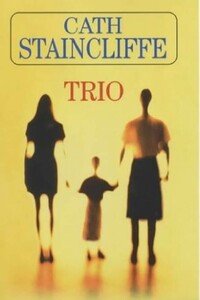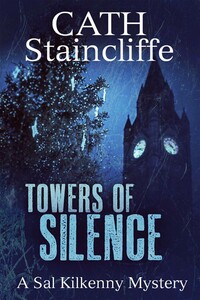‘Oh God.’ She sounded shell-shocked.
‘I’m sorry, we told everyone we could.’
‘I’ve been home – Denmark.’
A foreign student? ‘You knew him from university?’
‘Yes. I’m so sorry.’
‘No, no, that’s fine.’ And of course it wasn’t.
‘The funeral was last Thursday.’
‘Yes. Yes, I see.’
He heard her breathing change and understood as she quickly ended the call. He replaced the phone. Allowed his mind to swoop around those unforgettable images: the crimson snow, Jason’s blanched face as he sat in their lounge, his body in the hospital anteroom. Then he forced himself back outside to dig up the roots of the palm. He continued even when the drizzle came and made the spade slippery to handle. Even as the crumbs of soil sneaked into his gloves and rubbed against the skin. He tugged out the last of the roots and discarded them. Broke up the clods of soil and forked it over. It was dusk by the time he’d finished.
He showered while Val prepared a meal. He complimented the food, hoping to entice her to eat more.
‘What time are we round at your folks tomorrow?’ she asked him. He hadn’t told her that the call had been from one of Jason’s new friends.
‘Six,’ he invented. He would call and fix that up with his mother after tea. If it didn’t suit them, then he could easily tell Val the plans had altered.
Garrington. Like a splinter under his nail. The more he tried to disregard it, the more it nagged at him.
He lasted until late in the evening. Val had gone up, and he was having a nightcap, ostensibly watching a rerun of Coast, the documentary series about the British coastline.
He moved abruptly, went through to the study and wrestled the phone book from the stack of directories.
Frost… Gane… Gardner… Garrington. One entry: V, 22 Waterford Place, M20. He felt a shiver of excitement, a sort of sickly triumph. He tore the page out and folded it up. Put it in his pocket. The thrill of discovery beating inside him like a new heart.
Louise
Carl had brought vodka. Cherry vodka. From the distillery near his village, he said. The Poles were big on vodka, Louise had learnt, usually flavoured with fruit or herbs or honey. He’d brought duty-free cigarettes too. It was good of him, but within half an hour of Carl being there, Louise found her mind wandering. It was hard to concentrate on his stories from home; she felt irritated at the way he shook his head when he chuckled.
Driven to distraction, she thought, that’s what it feels like: everything’s popping up and zipping about and none of it is important any more. Too much clutter in her head, and all that mattered was Luke and Ruby.
She looked at Carl, the broad cheekbones, the honey colour of his skin, blond hair, his eyes, cat-like, wonderful eyes, and sighed. ‘I think we should give it a break – us, I mean.’
He looked dazed. ‘Really?’
‘It’s not you, Carl, it’s me, Luke, everything.’
‘But I want to help.’
‘There is no help.’ She turned her glass to and fro on the table. ‘It’s all I can do to give Ruby the time she needs, with work and hospital.’
‘You make it sound as if I am work for you,’ he complained. She saw petulance in the set of his jaw.
‘I don’t mean to.’ She didn’t want to get into it. Her mind was made up and nothing he could say would shift it. She didn’t want to pick over it, analyse it. Or hurt him any more. ‘You’ve been really good. I’m sorry.’ She frowned, pinched at the bridge of her nose. Now please, go.
‘You want us just to be friends?’
Did she even want that? ‘Yeah,’ she answered. Though she couldn’t really imagine it.
That tightness in his jaw again, then he cleared his throat. ‘Very well,’ he said, stiffly, formality his way of coping.
‘Please take these.’ She pushed the bottle and the cigarettes his way.
‘No, they are yours,’ he objected, getting up.
She stood too, awkward now, not knowing whether to approach him, to thank him. A farewell hug. He made no move, and she took her cue from him.
She was relieved when he had gone. She’d always known that she and Carl were a time-limited affair. Had realized that it would not lead to them moving in together or, God forbid, babies. She thought he had too, but perhaps he’d harboured hopes for more.




